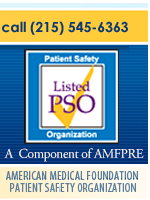The Peer Review Process
The Process
Peer Review of Individual Physicians >
Specialty Department Review >
Hospital Quality of Care Review >
Exclusive Contacts >
External peer review is an important tool for hospitals, medical staffs and legal counsel when they are confronted with concerns about quality and/or other serious problems, such as potential limitation or revocation of privileges. The evaluation of the quality of patient care by prominent experts is a responsibility the Foundation has undertaken for thousands of hospitals since 1987.
The type and extent of our review and resulting recommendations will depend upon the reasons that stimulated it and the guidance requested. We insure fair evaluations and offer support for implementing results be it through reeducation, re-credentialing, system reorganization, mediation or arbitration. Whenever possible, the Foundation attempts to work toward educational rather than punitive outcomes. The independent evaluation by nationally recognized clinicians within the same specialty being evaluated generates positive professional and behavioral change. When needed, on-site instruction, consulting, and information sharing with suggestions to improve skills, can be scheduled following reviews.
Our thoughtful assessments come quickly in a user-friendly format…
Reports and Recommendations
Following physician, department peer review or hospital-wide assessment, a report will be submitted to the health care facility. It will contain a critique of each case record reviewed that is directly responsive to the questions raised by the hospital. The principal findings and appropriate practical recommendations for hospital action are then summarized. If two physicians have simultaneously and independently reviewed the same records, the Foundation will send individual or combined records, depending upon the purpose of the review. We recommended that the hospital’s legal counsel be made aware of the written recommendations.
The length of time between submission of data by the hospital to the receipt of the final written report varies from a few weeks to approximately two months or more depending on the complexity of the review. The Foundation will make every effort to respond to emergency situations even more expeditiously.
After a specialty department review, the team of experts will develop a service plan specific to the needs of the department. This plan will outline the factors identified that are contributing to adverse outcome data or quality of care statistics. Recommendations will outline solutions and offer alternatives for positive improvement. In addition to recommendations for positive change and solutions to internal conflicts, the review report includes a remedial program developed by the expert reviewers. Several options may be listed, including educational programs that may be obtained through various specialty societies and our Division, the Foundation for Advanced Medical Education
Peer review is an educational opportunity…
Both physicians and hospitals appreciate the post-peer review preceptor programs administered through our division, The Foundation for Advanced Medical Education. One program for example, begins with a prominent preceptor who, in conjunction with didactic and laboratory simulator experience, demonstrates new or unfamiliar procedures to the preceptee at a university or other teaching hospital. This may be followed by the preceptor demonstrating surgical techniques for a defined period of time, and then traveling to observe on-site in the preceptee’ s own hospital. Our new telementoring or remote presence programs may be of assistance.

